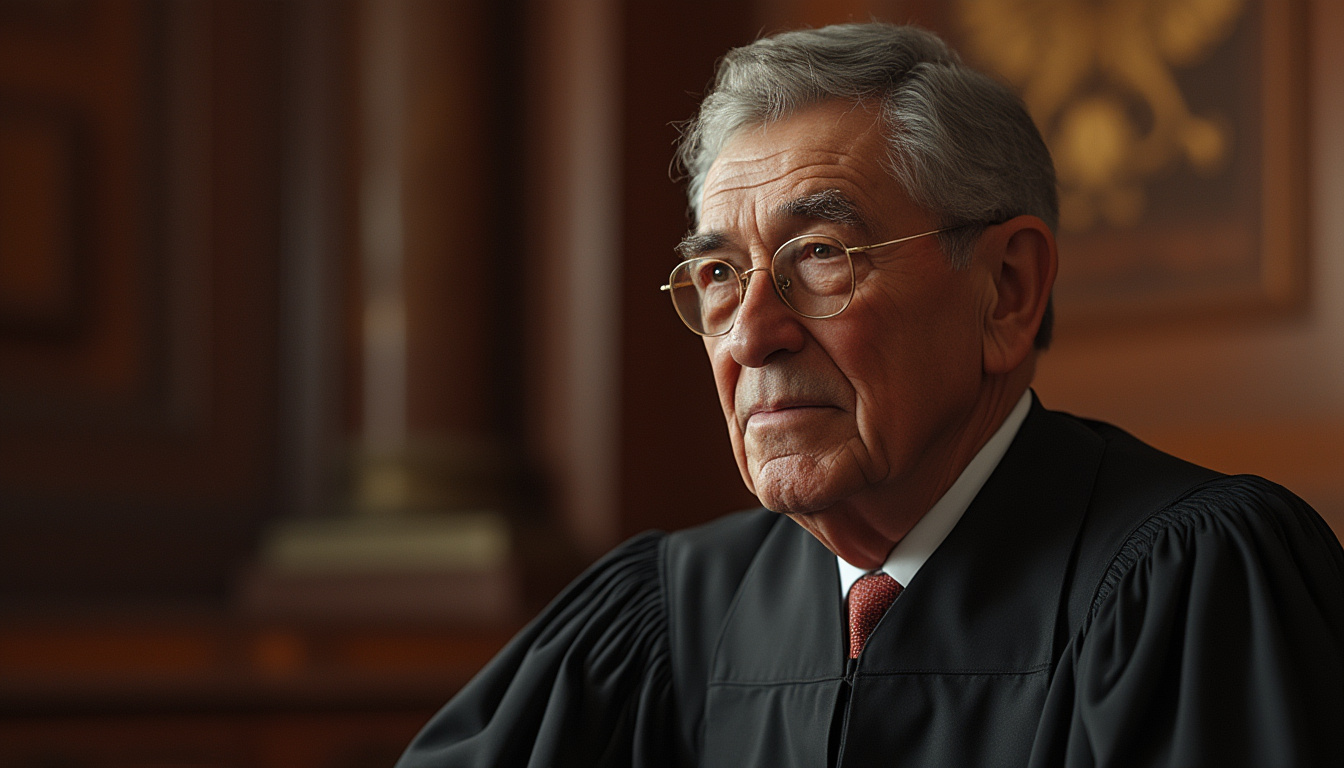A Justice System for Everyone: BC Chief Justice Leonard Marchand’s Vision for the Courts
In a historic appointment, Leonard Marchand became British Columbia’s first Indigenous Chief Justice in December 2023. A member of the Okanagan Indian Band, Marchand’s rise to the province’s highest court represents a transformative shift in Canada’s legal landscape.
Marchand’s journey is a testament to his dedication to justice and reconciliation. Before entering law, he worked as an engineer—a career path that might have seemed unrelated to his future in the judiciary. However, his transition to law was driven by a deeper purpose: to address the systemic inequities faced by Indigenous communities.
His career has been marked by groundbreaking achievements. Marchand played a pivotal role in helping residential school survivors negotiate the Indian Residential Schools Settlement Agreement, the largest class-action settlement in Canadian history. This work laid the foundation for his commitment to reconciliation and access to justice.
Marchand’s judicial career began in 2013 with the Provincial Court of British Columbia. He later served on the Supreme Court of British Columbia and the Court of Appeal for British Columbia and Yukon. His ascent to Chief Justice is not only a personal milestone but also a significant step toward diversifying Canada’s judiciary.
Throughout his career, Marchand has championed inclusivity and accessibility. He has modified traditional courtroom processes, such as engaging in inquisitorial questioning in family law cases, to ensure fairness and address the immediate needs of litigants. His approach reflects a judiciary that is both flexible and focused on delivering justice equitably.
As Chief Justice, Marchand emphasizes the importance of diversity on the bench. He believes that while the law must be applied impartially, a diverse judiciary brings varied perspectives, leading to more equitable outcomes. This vision is central to his efforts to rebuild trust in a justice system that has historically been dominated by white men.
Despite progress in increasing representation—thanks in part to the 2016 reforms to the judicial appointment process—Marchand acknowledges that challenges remain, particularly for Indigenous representation. He views diversity as essential to fostering fairness and trust in the justice system.
Marchand’s commitment to Indigenous justice is deeply personal and professional. He is acutely aware of the stark disparities faced by Indigenous peoples in Canada, who make up over 30% of the prison population despite being just 5% of the total population. These statistics underscore the systemic inequalities that persist in the justice system.
To address these issues, Marchand advocates for the integration of Indigenous legal traditions into Canada’s justice system. He believes that recognizing and respecting Indigenous legal orders is vital to creating a more inclusive and equitable legal framework.
Central to Marchand’s vision is the belief that the justice system should be understandable, responsive, and affordable for all Canadians. He seeks to demystify judicial processes and break down barriers that prevent marginalized communities from accessing legal remedies.
Through his leadership, Marchand is paving the way for a justice system that reflects Canada’s diverse population. His efforts to promote diversity, inclusion, and systemic change represent a pivotal moment in Canadian jurisprudence.
As Chief Justice, Leonard Marchand’s legacy is already taking shape. His work not only honors his Indigenous heritage but also sets a precedent for future generations of jurists. His vision of a justice system that serves everyone equitably is a powerful reminder of the transformative potential of leadership and inclusion.
Continuing the Vision for a Transformative Justice System
Leonard Marchand’s professional journey is a beacon of transformative change in Canada’s legal landscape. His transition from engineering to law was driven by a profound commitment to addressing systemic inequities, particularly for Indigenous communities. This commitment was evident in his pivotal role in the Indian Residential Schools Settlement Agreement, the largest class-action settlement in Canadian history, which laid the groundwork for his dedication to reconciliation and justice.
Marchand’s judicial career, beginning in 2013 with the Provincial Court of British Columbia, showcased his innovative approach to family law cases. By engaging in inquisitorial questioning, he demonstrated a judiciary that is both flexible and equitable, ensuring fairness and addressing the immediate needs of litigants. His subsequent appointments to the Supreme Court of British Columbia and the Court of Appeal for British Columbia and Yukon underscored his growing influence and commitment to judicial excellence.
As a champion of diversity and inclusion, Marchand emphasizes the crucial role of a diverse judiciary in fostering equitable outcomes. The 2016 reforms to the judicial appointment process have significantly increased representation of women and racialized individuals, yet Marchand acknowledges the ongoing challenges, particularly for Indigenous representation. He views diversity as essential to rebuilding trust in a justice system historically dominated by white men.
Marchand’s focus on Indigenous justice is both urgent and personal. The stark reality of Indigenous overrepresentation in Canadian prisons, comprising over 30% of the population despite being only 5%, highlights systemic inequalities. He advocates for the integration of Indigenous legal traditions, recognizing their vital role in creating a more inclusive legal framework. This approach fosters mutual understanding and respect for legal pluralism, essential for equitable justice.
Central to Marchand’s vision is the belief that the justice system should be understandable, responsive, and affordable for all Canadians. He seeks to demystify judicial processes and break down barriers that prevent marginalized communities from accessing legal remedies. His efforts aim to enhance public trust and ensure that justice is accessible to everyone.
Through his leadership, Marchand is paving the way for a justice system that reflects Canada’s diverse population. His work honors his Indigenous heritage and sets a precedent for future generations of jurists. Marchand’s vision of a justice system that serves everyone equitably is a powerful reminder of the transformative potential of leadership and inclusion.

Conclusion
The appointment of Leonard Marchand as British Columbia’s first Indigenous Chief Justice marks a significant milestone in Canada’s legal history. His journey from engineering to law, driven by a commitment to addressing systemic inequities, underscores his dedication to justice and reconciliation. Marchand’s pivotal role in the Indian Residential Schools Settlement Agreement and his innovative judicial approaches highlight his transformative impact on the legal landscape.
Marchand’s vision for a diverse and inclusive judiciary is central to his efforts to create a justice system that is equitable and accessible to all. By integrating Indigenous legal traditions and advocating for systemic change, he is paving the way for a more just and fair society. His legacy is not only a testament to his own achievements but also a beacon of hope for future generations of jurists and Canadians alike.
As Chief Justice, Leonard Marchand’s commitment to diversity, inclusion, and accessibility continues to shape a justice system that reflects Canada’s diverse population. His work honors his Indigenous heritage and sets a precedent for a more inclusive and equitable legal framework. Marchand’s vision of a justice system that serves everyone equitably is a powerful reminder of the transformative potential of leadership and inclusion.
FAQ
Who is Leonard Marchand?
Leonard Marchand is the first Indigenous Chief Justice of British Columbia, appointed in December 2023. A member of the Okanagan Indian Band, he has been a pivotal figure in advancing justice and reconciliation for Indigenous communities in Canada.
What was Marchand’s role in the Indian Residential Schools Settlement Agreement?
Leonard Marchand played a key role in helping residential school survivors negotiate the Indian Residential Schools Settlement Agreement, the largest class-action settlement in Canadian history. This work laid the foundation for his commitment to reconciliation and access to justice.
How has Marchand promoted diversity in the judiciary?
Marchand has championed diversity and inclusion throughout his career. He emphasizes the importance of a diverse judiciary in fostering equitable outcomes and has worked to increase representation of underrepresented groups in the legal system.
What is Marchand’s vision for the justice system?
Marchand envisions a justice system that is understandable, responsive, and affordable for all Canadians. He seeks to demystify judicial processes and break down barriers that prevent marginalized communities from accessing legal remedies.
How is Marchand addressing Indigenous overrepresentation in prisons?
Marchand advocates for the integration of Indigenous legal traditions into Canada’s justice system. He believes that recognizing and respecting Indigenous legal orders is vital to creating a more inclusive and equitable legal framework, which can help address the systemic inequalities contributing to Indigenous overrepresentation in prisons.



